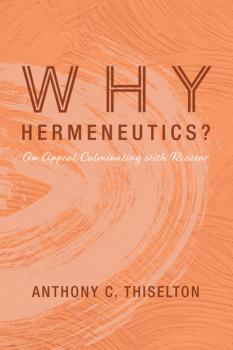ТОП просматриваемых книг сайта:
Anthony C. Thiselton
Список книг автора Anthony C. ThiseltonАннотация
"These recollections of a life-time in the Church and in different universities give rise to a diverse series of anecdotes, which provide, first, some entertaining humor, second, a glimpse into both academic and church life, and third my attempted contributions to Christian theology. Teaching in five British universities, belonging to such church national bodies as fifteen years on the Church of England General Synod, twenty-eight years serving on the Doctrine Commission, and many years on other Church committees, as well as secular national bodies . . . has left a reservoir of diverse memories that some have thought worth sharing. At the beginning there is more about the providence of God and my own mistakes than anything else. These chapters begin with a relatively high ratio of entertainment, but become increasingly theological in the later chapters. Towards the end, my story concerns teaching in America, Korea, and elsewhere. Although the Church of England and British universities often provide a focus, my overseas doctoral graduates assure me that the story would be of international interest. Those who have read one of my twenty books (and three more to come) may also have a special interest in it." From the Preface
Аннотация
In this little volume, Anthony Thiselton makes an impassioned appeal for closer attention to the philosophy of hermeneutics. Emilio Betti provocatively observes that hermeneutics ought to constitute an obligatory course for most degrees in the humanities. Hermeneutics, he insists, teaches patience, tolerance, respect for other views, understanding, and humility, while holding one's own views with firmness and generosity. Yet many teaching institutions do not yet recognize this. With this in mind, Thiselton first considers and responds to those who argue that hermeneutics is not necessary. Then he considers anew more sophisticated thinkers on the subject. Types of texts and hermeneutical models, he argues, are almost infinite, a fact many biblical scholars do not recognize. In the field of biblical hermeneutics, too many view the Bible as one thing, or as a monochrome landscape–it is not. The culmination of Thiselton's case consists in a sustained reflection on the impressive work of Paul Ricoeur, selecting thirteen points of genuine advance his work makes. With a glossary of fifty technical terms this is a volume that will prove helpful to student and scholar alike.
Аннотация
In this clear, practical, and relatively brief commentary, Anthony Thiselton brings to bear his intimate knowledge of Paul's theology, the ancient city of Corinth, and Paul's epistles to the church of that city. The commentary is not only critical and exegetical, but also has a focus on practical and pastoral reflection. Second Corinthians is Paul's most passionate epistle. It shows him to be a man of very deep feeling, who sometimes has to be frank, even blunt, with those who seek to undermine his work. In this commentary, we see the inner turmoil of a devoted missionary pastor and apostle. We also have the opportunity to explore how power can be expressed through weakness by pastors and all Christians who follow a Christ crucified and risen.
Аннотация
Few Christian writings have had the world-changing impact of St Paul's epistles to the churches, and yet from the very beginning these works proved themselves to be tricky texts. The Second Letter of Peter, commenting about them, says: «There are some things in them that are hard to understand» (2 Pet 3:16). Indeed! To this day many issues of their interpretation remain highly contested. In this book, Anthony Thiselton grasps the nettle and examines forty puzzling passages from Paul's epistles. He considers the various scholarly proposals about their meaning and offers his own reflections in the hope of dispersing fog and shedding light, and of expounding a coherent and self-consistent Paul.
Аннотация
Wolfhart Pannenberg has forever changed the face of twentieth-century theology. His book on Christology constituted a turning-point away from Bultmann's existentialist theology, and convincingly vindicated belief in the bodily resurrection of Jesus and its importance for theology. His numerous other works, especially his Systematic Theology, Theological Anthropology, and Theology and the Philosophy of Science, show both depth of learning and an unsurpassed and enviable range of interests. This book aims to explain the vast scope of Pannenberg's thought, his understanding of the sovereignty and majesty of the God as the God of all reality (not only Israel and the church), who also revealed himself in Jesus Christ. Jesus is not simply the pre-resurrection Jesus of many Gospel narratives, but the raised and exalted Christ of the whole New Testament. Pannenberg shines a light on the centrality of futurity, and of the whole of reality in God's purposes. Meaning becomes clear in the light of the whole, as his hermeneutics explains. He expounds the role of God as Trinity and the Holy Spirit. His vision of God and the whole world is breath-taking, and often heartening and practical.
Информация о книге
Автор произведения Anthony C. Thiselton
Жанр Религия: прочее
Серия Cascade Companions





